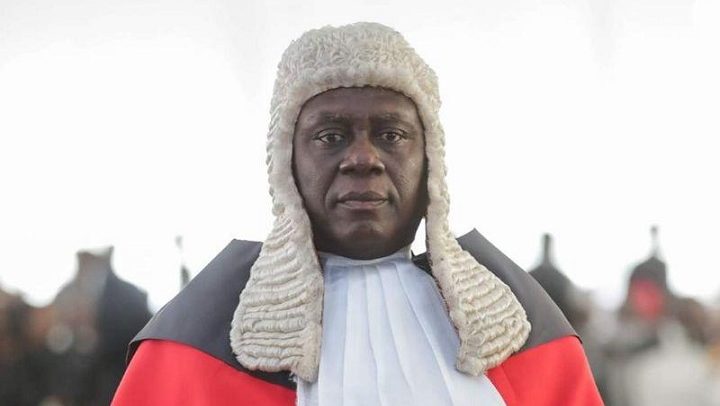Chief Justice Kwesi Anin Yeboah
THE SUPREME Court (SC) has detailed reasons why a Deputy Speaker or any person presiding over Parliament, in the absence of the Speaker, is entitled to be counted and can take part in voting.
The court, in its judgment written by Justice Yonni Kulendi, explained that if the case before it was purely about the decision of the Minority rejecting the 2022 budget, and the Majority later approving it, the court would have considered it not appropriate for judicial determination.
“However, to the extent that the challenge to these proceedings in the third issue are equally anchored on rival interpretations to the combined reading of Articles 102 and 104 of the Constitution, the only court mandated under Article 130 to interpret the true and proper meaning of these provisions of the constitution, is this court,” he pointed out.
The Apex Court, in its judgment, recognised the fact that Parliament is the master of its own procedures, but added that “it cannot be over-emphasised that all the House’s rules, orders, procedures and practices also have a master, the 1992 Constitution of the Republic of Ghana.”
The court’s judgment is on a writ filed by a private legal practitioner and a lecturer, Justice Abdulai, seeking interpretation of Article 102 and 104(1) of the Constitution and the validity of the NPP approving the 2022 budget, with the First Deputy Speaker who presided also voting.
Quorum
The court, explaining what quorum meant per Article 102 and 104(1), held that the rationale for having two separate quorum provisions is simple, as business of Parliament is diverse.
It says the constitution sets a lower threshold quorum – one-third of the full membership of Parliament, not including the Speaker or Deputy Speaker who may be presiding at the time.
With the other quorum where Parliament must exercise its legislative power to determine a matter, the constitution sets a higher quorum threshold, requiring at least half of members present and this includes the Deputy Speaker presiding in the absence of the Speaker.
“The exclusion of a presiding Deputy Speaker from the ‘non-voting quorum’, on the one hand and his or her inclusion in the ‘voting quorum’, on the other hand, again underscores the fact that the different functions of Parliament are not regarded as being on the same order of importance or magnitude.”
The court, therefore, declared that a Deputy Speaker is entitled to be counted for the purposes of forming a quorum under Article 104(1).
Touching on why a Deputy Speaker can vote, the court held that unlike the Speaker, who must relinquish his or her membership upon being elected as Speaker, both deputies are required to be MPs and remain so to hold office of Deputy Speakers.
The court held that whilst Article 104(2) of the Constitution provides unequivocally that the Speaker shall have neither an original nor casting vote, no such outright voting disqualification is placed on a Deputy Speaker, whether or not he or she is presiding in the House in the absence of the Speaker.
It said the only disqualification placed on the voting right of a Member of Parliament is in Article 104(5) with regard to a member “who is a party to or a partner in a firm which is a party to a contract with the government.”
The court further added that the Speaker is disqualified from voting because he is not a Member of Parliament, and voting is only a right for members of the House.
“Members of Parliament sit in Parliament as elected representatives of their respective constituencies. Parliament operates on the standard democratic principle of equal representation or ‘one member, one vote,’ with matters decided by majority vote. Therefore, to cause a member to forfeit their vote in Parliament merely on account of having to preside over the business of the House in the Speaker’s absence would unfairly disenfranchise not only the presiding member but also their constituents,” the court added.
On the issue of the 138 majority, including the First Deputy Speaker, approving the budget, the court concluded that “no proceedings of Parliament can be invalidated by reason of the fact that a member presiding has exercised his or her constitutionally sanctioned right to be counted for quorum and to vote in a decision.”
BY Gibril Abdul Razak


